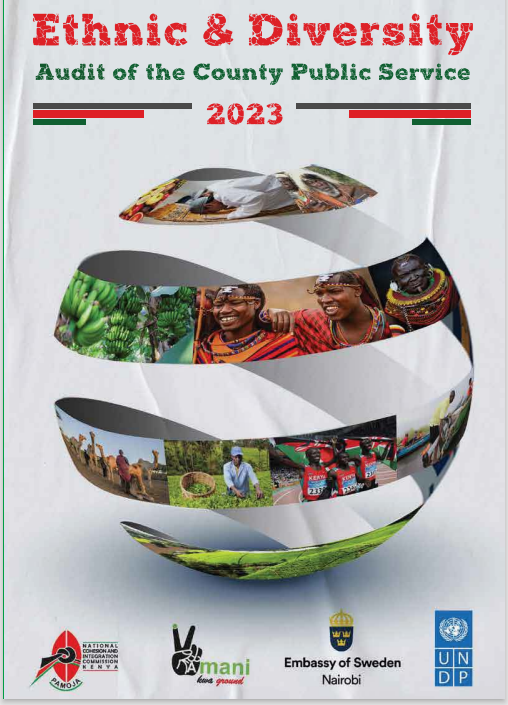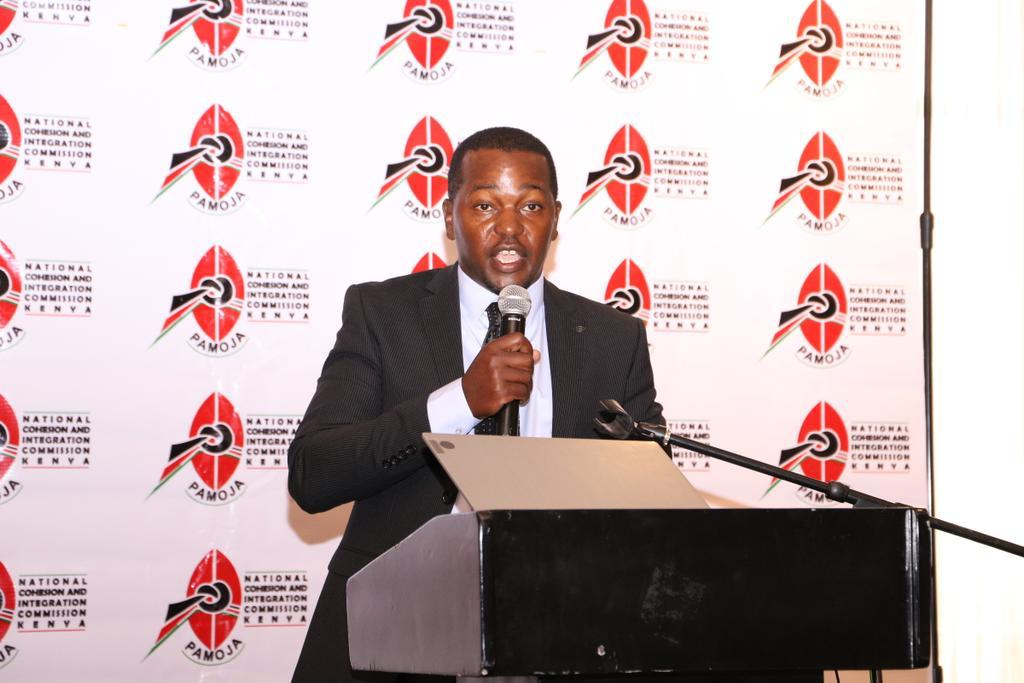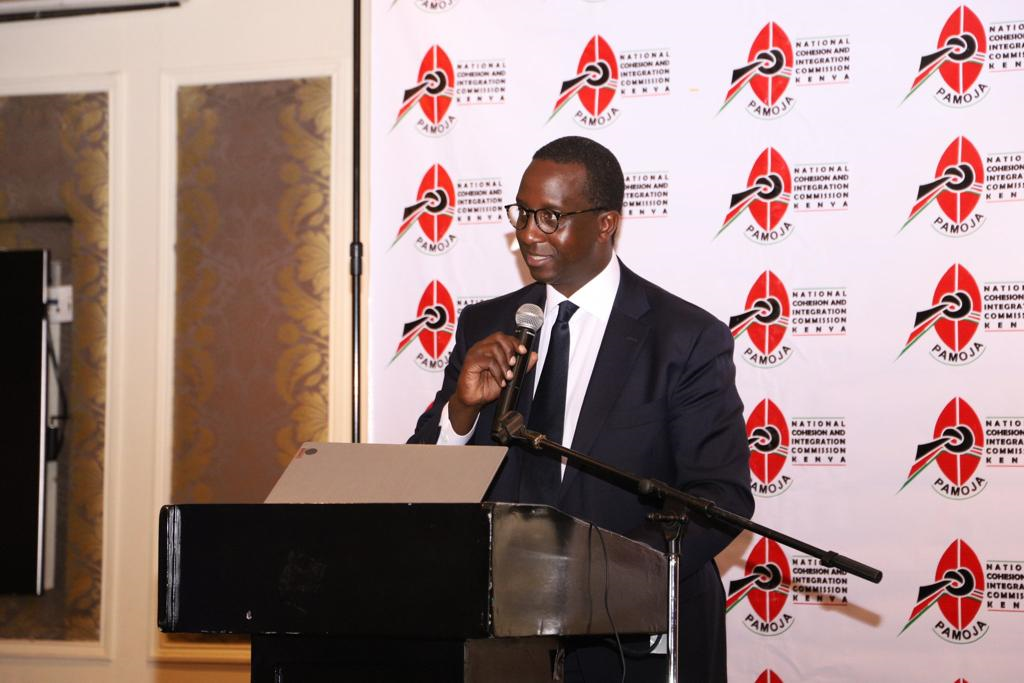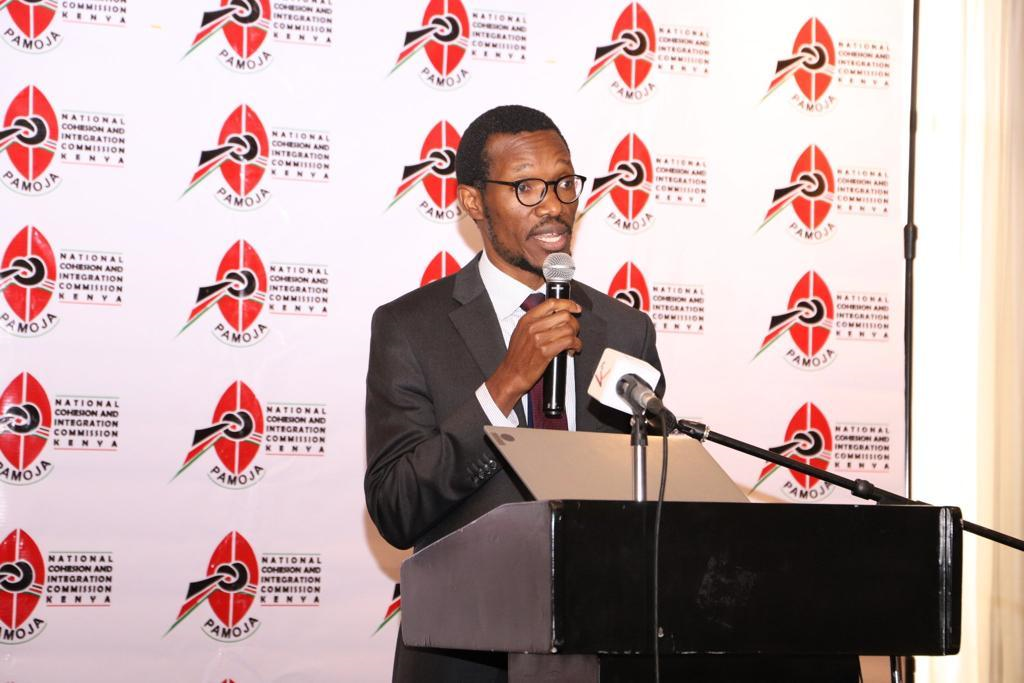The National Cohesion and Integration Commission (NCIC), ON Friday 17th November, 2023 launched a report on Ethnic and Diversity Audit of the Public Service sector. The main objective for undertaking this audit was to ascertain the progress made towards attaining inclusivity in employment post 10 years of devolution, in line with the CGA No. 17 of 2012, and other legal provisions on enhancing inclusivity and diversity in the workplace. The event which was graced by NCIC’s development partners;UNDP InterPeace, Embassy of Sweden, Human Rights groups and Civil Societies took place at the Villa Rosa Kempinski in Nairobi.
The event marked the second ethnic and diversity audit report done by the Commission preceding the 2016 report. The Ethnic and Diversity highlighted that over 80% of jobs in the country are dominated by 10 tribes led by Kalenjins (15.83%), Kikuyus (15.77%), Luhyas (11.6%) and Luos (9.81%) while 1% of jobs represent 29 tribes. The reports also revealed the total workforce in the country which is 184,876, 53% female, 47% male and only 1.14% representing people with disability. (PWDs). Nairobi County has the highest number of employees at 13,513 which represents 7.37% of the distribution of jobs in the counties. On the other hand, the report indicates that only four minority ethnic groups – Somali 4.31%, Maasai 4.0%, Turkana 1.92% and Taita 1.56% are the most represented in County Public Service.

The Ethnic and Diversity Audit of the County Public Service, 2023
The report further validates the fact that the minority are still far from achieving adequate representation in the county employment post 10 years of devolution. In its finding, the report revealed that only 13 out of the 47 counties compliant with the law when it comes to the policy of hiring. Counties like Narok, Tharaka Nithi, Taita Taveta, Embu, Busia, Trans Nzoia, Nakuru, Isiolo, Mombasa, Tana River and Nairobi are compliant, while others like 34 out of 47 counties have contravened, according more than 30% of the vacancies at the entry level to members of ethnic groups that are not from the dominant communities.

Mr. Harrison Kariuki Ag. CEO NCIC during the launch of the Ethnic and Diversity Audit report on 17th November, 2023.
The CEO of the Commission Mr. Harrison Kariuki, in his welcoming remarks said that the Commission’s commitment in ensuring cohesion through continuous improvement in diversity, equity and inclusion has been the driving force behind the ethnic and diversity audit report.
InterPeace president Mr. Itonde Kakoma was also in attendance, and reminded people that peace is not merely the absence of war, it is a virtue, a state of mind, a disposition for benevolence, confidence and justice.

Mr. Itonde Kakoma president InterPeace Kenya at the Ethnic and Diversity report launch, on 17th November, 2023.
In attendance also to witness the launch of the report, was UNDP Kenya representative Dr. Dan Juma who emphasized that, to ensure no one is left behind, stakeholders should renew their commitment to see how we can foster an environment where every individual regardless of race, colour and other identities are empowered.

Dr. Dan Juma, UNDP Kenya representative during the launch of the Ethnic and Diversity audit, on 17th November, 2023.
The chairperson, Council of Governors H.E Anne Waiguru, EGH, OGW was represented by Tom Kataka, who read the opening remarks. She expressed her heartfelt gratitude to all those who played a role in developing the meaningful report, and stated that one of the pillars that has promoted ethnic diversity is devolution through the decentralized system of governance which has enabled Counties to enact legislations geared towards addressing challenges faced by different groups. She also acknowledged that the launch is a clarion call that Kenya’s diversity is an asset, and as a council, they firmly believe that when we work, think and act to leverage that asset, we are not only seizing one of the greatest opportunities of our age but also contributing to the larger narrative of a harmonious Kenya.
National Cohesion and Integration Commissioners Danvas and Vice Chair Wambui Nyutu gave a comparative analysis, county specific findings, emerging issues, challenges and recommendations in the report in their presentations during the launch. The vice chair urged Kenyan leaders to be intentional by making deliberate efforts to reach out to the marginalized communities to show them that they matter.

Vice Chair NCIC, Wambui Nyutu OGW during the launch of the Ethnic and Diversity Audit report launch
In his speech, the NCIC Chairman Dr. Rev. Samuel Kobia said that social cohesion pillar is essential for ensuring that all Kenyans benefit from the country's development, regardless of their ethnicity, religion, or gender. The chairman also added that the Bottom- Up Transformative Agenda aims to improve the lives of Kenyans at the grassroots level and is based on the principle of devolved government, which offers more power to local communities to make decisions about their own development including ethnically inclusive employment.
The chairman also mentioned that the commission is seeking the cooperation of the governors, as the commission has started a process towards ethnic audits of the County Governments and National institutions, and requested them to share the ethnic and/ or clan statistical data in employment to help with discerning compliance with Section 7, (1, 2) of the NCI Act No. 12 of 2008.

The NCIC Chairman Dr. Rev Kobia with stakeholders and partners during the launch of the Report
In the awards category, Marsabit County emerged the most compliant and carried home the most awards in the same category. Borana, which is the dominant tribe represents 33.41% of job enrolment in the devolved unit in Marsabit. According to Mr. Ambrose who is the chairperson of the Marsabit County Public Service board, the board has more than nine policies that guard towards ensuring compliance with hiring standards stipulated in the constitution. Bomet County was the worst compliant county with Kalenjin, which is the dominant tribe. representing 97% of staff employment. Out of its total 3,357 employees, 3,268 are Kalenjins while Kisii come in a distant second with a mere 26 employees. West Pokot County is placed as the worst regressed county with a negative 42.35% decline in diversity.
The commission concluded the event with Hon. Eng. Philip Okundi giving a vote of thanks to everyone; from stakeholders from state to non- state who came to witness the launch of the report and to the special team that worked tirelessly to ensure the report was a success. The commissioner also recognized the leadership of the country for promoting diversity and inclusivity, and urged everyone to strive towards attaining the required legal provisions to ensure compliance within the counties.



